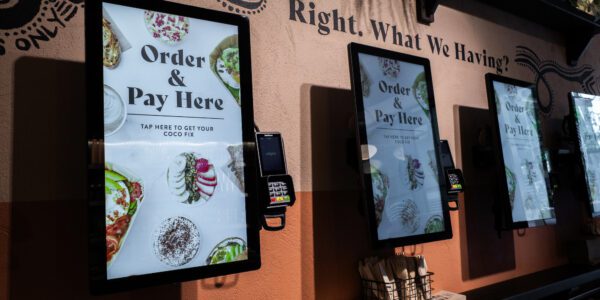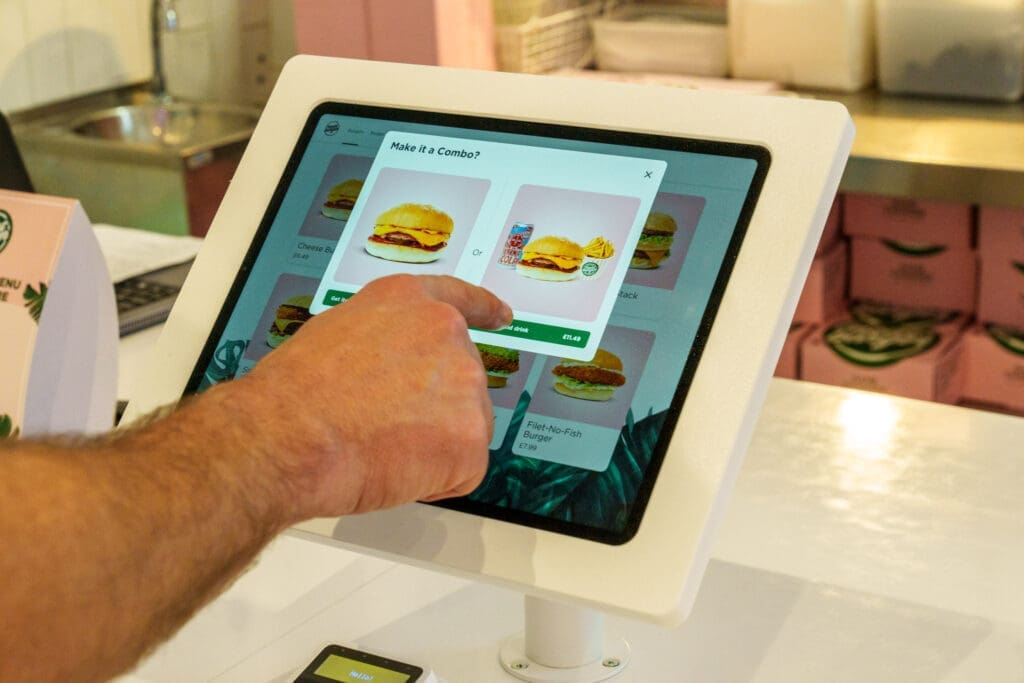7 incredible benefits of using self service kiosks in your restaurant
Self serve kiosks aren’t just for McDonalds any more. Discover the financial and operational benefits of kiosks and why they might be right for your restaurant.

Times are tough, but some brands are proving tougher. What’s their secret?
We recently brought together an exciting panel of experts – Michael Tingsager, founder of Hospitality Mavericks, Peter Backman, Strategic Business Consultant for Foodservice & Delivery and our very own Nick Liddle – to discuss ‘Building a Resilient Restaurant in Tough Times’.
The panel explored what top hospitality operators are doing to survive current market conditions, and how technology can fuel growth, both now and into the future.
Up for discussion were key market insights such as how operators – including LEON, HOP Vietnamese and McDonald’s – build an omnichannel experience to increase revenue, and the positive relationship technology can have with the human experience.
To survive this challenging time, operators must be prepared to take opportunities wherever they arise. Diversifying and opening up to new markets and revenue streams will be essential to not just surviving but also growing.
Building out your brand and engaging with customers through different channels – think delivery, retail and supermarkets or even your own restaurants – will give you greater opportunity to sell your product, engage with new customers and widen your customer base.
“Restaurant and food retail brands need to learn how to engage with their customers in a seamless way, across all channels. Whether that’s in-store or through delivery, creating an omnichannel experience that feels authentic to your brand will allow customers to engage with you when it’s convenient for them.”
So you’ve decided to diversify your revenue streams…
But when expanding into new channels and exploring new options, it’s important to evaluate exactly what you’re trying to achieve, and who your demographic is. Think about:
Once you’ve established the above, you need to ensure your entire organisation is committed to the change, happy to try new ideas and accepts that you may make mistakes along the way.
When you’re going through fundamental change, it’s essential to measure the impact of that change and to be laser focused on the data.
“Only through having a culture of change will people be allowed to commit to that process. We know it’s a hectic time for operators, and you really want the tech to work out of the box, but when you invest in committing to that level of change, you’ll get a good outcome.”
At McDonald’s, everything they do is geared towards evolving the business. But it’s not about making one big change and hoping for the best. McDonald’s is constantly innovating and adapting. They make small, incremental changes that are easy to tweak, improve and if necessary, remove.
“Everything is focused on the customers – everything has to be engaging, make their lives easier, and personalise their McDonald’s experience. Not only that, but it has to work for our customers 65 million times a day. So everything we create must always be available and able to scale to support our restaurants and guests around the world”.

“But adding in technology to our operations destroys the human experience, and might scare our staff” – wrong!
When you move away from a purely POS model, the focus should still remain on creating meaningful connections between the team and your customers.
Tech has never been designed to replace the human experience.
Rather, technology enables your teams to evolve and flourish. If you decide to use tech to automate tasks, it’s essential to empower your team with the right skills and knowledge to confidently engage with customers in new ways.
For instance, if using self-service kiosks to automate your ordering process, you can introduce a personal meet and greet at the door or say the customers’ name when their order is ready.
That’s what brings people and tech together, and that is what will enhance your customer experience.
We know times are tough right now and the industry is facing a host of challenges that are out of its control.
How you act now will make a huge difference to your success in the coming months.
Building an omnichannel experience will enable you to explore new revenue streams, but it’s important to remember that it’s a continuous process.
Implementing a ‘build, measure, learn’ process will enable you to optimise and implement change over time.
Future-proofing your brand with these three winning secrets will set you up for success.
Got more questions that need answers? Book a free consultation below to chat with an expert.
Self serve kiosks aren’t just for McDonalds any more. Discover the financial and operational benefits of kiosks and why they might be right for your restaurant.

Learn the benefits of centralising your hospitality data, and how easy-to-read, real-time reports will help you scale your business.

Innovating Hospitality: Lessons from the Retail Sector
